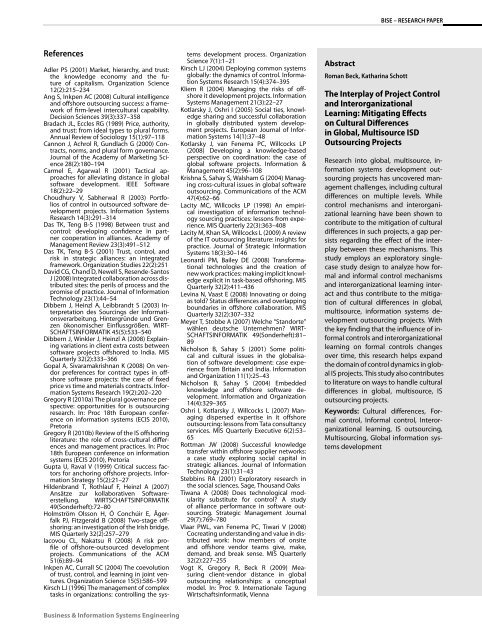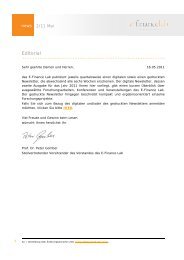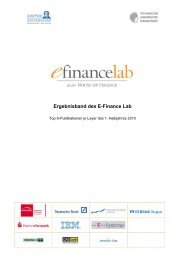Prof. Dr. Wolfgang König, Prof. Dr.-Ing. Ralf ... - E-Finance Lab
Prof. Dr. Wolfgang König, Prof. Dr.-Ing. Ralf ... - E-Finance Lab
Prof. Dr. Wolfgang König, Prof. Dr.-Ing. Ralf ... - E-Finance Lab
Create successful ePaper yourself
Turn your PDF publications into a flip-book with our unique Google optimized e-Paper software.
References<br />
Adler PS (2001) Market, hierarchy, and trust:<br />
the knowledge economy and the future<br />
of capitalism. Organization Science<br />
12(2):215–234<br />
Ang S, Inkpen AC (2008) Cultural intelligence<br />
and offshore outsourcing success: a framework<br />
of firm-level intercultural capability.<br />
Decision Sciences 39(3):337–358<br />
Bradach JL, Eccles RG (1989) Price, authority,<br />
and trust: from ideal types to plural forms.<br />
Annual Review of Sociology 15(1):97–118<br />
Cannon J, Achrol R, Gundlach G (2000) Contracts,<br />
norms, and plural form governance.<br />
Journal of the Academy of Marketing Science<br />
28(2):180–194<br />
Carmel E, Agarwal R (2001) Tactical approaches<br />
for alleviating distance in global<br />
software development. IEEE Software<br />
18(2):22–29<br />
Choudhury V, Sabherwal R (2003) Portfolios<br />
of control in outsourced software development<br />
projects. Information Systems<br />
Research 14(3):291–314<br />
Das TK, Teng B-S (1998) Between trust and<br />
control: developing confidence in partner<br />
cooperation in alliances. Academy of<br />
Management Review 23(3):491–512<br />
Das TK, Teng B-S (2001) Trust, control, and<br />
risk in strategic alliances: an integrated<br />
framework. Organization Studies 22(2):251<br />
David CG, Chand D, Newell S, Resende-Santos<br />
J (2008) Integrated collaboration across distributed<br />
sites: the perils of process and the<br />
promise of practice. Journal of Information<br />
Technology 23(1):44–54<br />
Dibbern J, Heinzl A, Leibbrandt S (2003) Interpretation<br />
des Sourcings der Informationsverarbeitung.<br />
Hintergründe und Grenzen<br />
ökonomischer Einflussgrößen. WIRT-<br />
SCHAFTSINFORMATIK 45(5):533–540<br />
Dibbern J, Winkler J, Heinzl A (2008) Explaining<br />
variations in client extra costs between<br />
software projects offshored to India. MIS<br />
Quarterly 32(2):333–366<br />
Gopal A, Sivaramakrishnan K (2008) On vendor<br />
preferences for contract types in offshoresoftwareprojects:thecaseoffixed<br />
price vs time and materials contracts. Information<br />
Systems Research 19(2):202–220<br />
Gregory R (2010a) The plural governance perspective:<br />
opportunities for is outsourcing<br />
research. In: Proc 18th European conference<br />
on information systems (ECIS 2010),<br />
Pretoria<br />
Gregory R (2010b) Review of the IS offshoring<br />
literature: the role of cross-cultural differences<br />
and management practices. In: Proc<br />
18th European conference on information<br />
systems (ECIS 2010), Pretoria<br />
Gupta U, Raval V (1999) Critical success factors<br />
for anchoring offshore projects. Information<br />
Strategy 15(2):21–27<br />
Hildenbrand T, Rothlauf F, Heinzl A (2007)<br />
Ansätze zur kollaborativen Softwareerstellung.<br />
WIRTSCHAFTSINFORMATIK<br />
49(Sonderheft):72–80<br />
Holmström Olsson H, Ó Conchúir E, Ågerfalk<br />
PJ, Fitzgerald B (2008) Two-stage offshoring:<br />
an investigation of the Irish bridge.<br />
MIS Quarterly 32(2):257–279<br />
Iacovou CL, Nakatsu R (2008) A risk profile<br />
of offshore-outsourced development<br />
projects. Communications of the ACM<br />
51(6):89–94<br />
Inkpen AC, Currall SC (2004) The coevolution<br />
of trust, control, and learning in joint ventures.<br />
Organization Science 15(5):586–599<br />
Kirsch LJ (1996) The management of complex<br />
tasks in organizations: controlling the sys-<br />
Business & Information Systems Engineering<br />
tems development process. Organization<br />
Science 7(1):1–21<br />
Kirsch LJ (2004) Deploying common systems<br />
globally: the dynamics of control. Information<br />
Systems Research 15(4):374–395<br />
Kliem R (2004) Managing the risks of offshore<br />
it development projects. Information<br />
Systems Management 21(3):22–27<br />
Kotlarsky J, Oshri I (2005) Social ties, knowledge<br />
sharing and successful collaboration<br />
in globally distributed system development<br />
projects. European Journal of Information<br />
Systems 14(1):37–48<br />
Kotlarsky J, van Fenema PC, Willcocks LP<br />
(2008) Developing a knowledge-based<br />
perspective on coordination: the case of<br />
global software projects. Information &<br />
Management 45(2):96–108<br />
Krishna S, Sahay S, Walsham G (2004) Managing<br />
cross-cultural issues in global software<br />
outsourcing. Communications of the ACM<br />
47(4):62–66<br />
Lacity MC, Willcocks LP (1998) An empirical<br />
investigation of information technology<br />
sourcing practices: lessons from experience.<br />
MIS Quarterly 22(3):363–408<br />
Lacity M, Khan SA, Willcocks L (2009) A review<br />
of the IT outsourcing literature: insights for<br />
practice. Journal of Strategic Information<br />
Systems 18(3):30–146<br />
Leonardi PM, Bailey DE (2008) Transformational<br />
technologies and the creation of<br />
new work practices: making implicit knowledge<br />
explicit in task-based offshoring. MIS<br />
Quarterly 32(2):411–436<br />
Levina N, Vaast E (2008) Innovating or doing<br />
as told? Status differences and overlapping<br />
boundaries in offshore collaboration. MIS<br />
Quarterly 32(2):307–332<br />
Meyer T, Stobbe A (2007) Welche “Standorte”<br />
wählen deutsche Unternehmen? WIRT-<br />
SCHAFTSINFORMATIK 49(Sonderheft):81–<br />
89<br />
Nicholson B, Sahay S (2001) Some political<br />
and cultural issues in the globalisation<br />
of software development: case experience<br />
from Britain and India. Information<br />
and Organization 11(1):25–43<br />
Nicholson B, Sahay S (2004) Embedded<br />
knowledge and offshore software development.<br />
Information and Organization<br />
14(4):329–365<br />
Oshri I, Kotlarsky J, Willcocks L (2007) Managing<br />
dispersed expertise in it offshore<br />
outsourcing: lessons from Tata consultancy<br />
services. MIS Quarterly Executive 6(2):53–<br />
65<br />
Rottman JW (2008) Successful knowledge<br />
transfer within offshore supplier networks:<br />
a case study exploring social capital in<br />
strategic alliances. Journal of Information<br />
Technology 23(1):31–43<br />
Stebbins RA (2001) Exploratory research in<br />
the social sciences. Sage, Thousand Oaks<br />
Tiwana A (2008) Does technological modularity<br />
substitute for control? A study<br />
of alliance performance in software outsourcing.<br />
Strategic Management Journal<br />
29(7):769–780<br />
Vlaar PWL, van Fenema PC, Tiwari V (2008)<br />
Cocreating understanding and value in distributed<br />
work: how members of onsite<br />
and offshore vendor teams give, make,<br />
demand, and break sense. MIS Quarterly<br />
32(2):227–255<br />
Vogt K, Gregory R, Beck R (2009) Measuring<br />
client-vendor distance in global<br />
outsourcing relationships: a conceptual<br />
model.In:Proc9.InternationaleTagung<br />
Wirtschaftsinformatik, Vienna<br />
Abstract<br />
Roman Beck, Katharina Schott<br />
BISE – RESEARCH PAPER<br />
The Interplay of Project Control<br />
and Interorganizational<br />
Learning: Mitigating Effects<br />
on Cultural Differences<br />
in Global, Multisource ISD<br />
Outsourcing Projects<br />
Research into global, multisource, information<br />
systems development outsourcing<br />
projects has uncovered management<br />
challenges, including cultural<br />
differences on multiple levels. While<br />
control mechanisms and interorganizational<br />
learning have been shown to<br />
contribute to the mitigation of cultural<br />
differences in such projects, a gap persists<br />
regarding the effect of the interplay<br />
between these mechanisms. This<br />
study employs an exploratory singlecase<br />
study design to analyze how formal<br />
and informal control mechanisms<br />
and interorganizational learning interact<br />
and thus contribute to the mitigation<br />
of cultural differences in global,<br />
multisource, information systems development<br />
outsourcing projects. With<br />
the key finding that the influence of informal<br />
controls and interorganizational<br />
learning on formal controls changes<br />
over time, this research helps expand<br />
the domain of control dynamics in global<br />
IS projects. This study also contributes<br />
to literature on ways to handle cultural<br />
differences in global, multisource, IS<br />
outsourcing projects.<br />
Keywords: Cultural differences, Formal<br />
control, Informal control, Interorganizational<br />
learning, IS outsourcing,<br />
Multisourcing, Global information systems<br />
development








